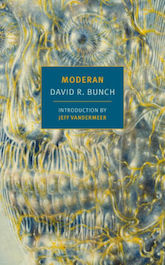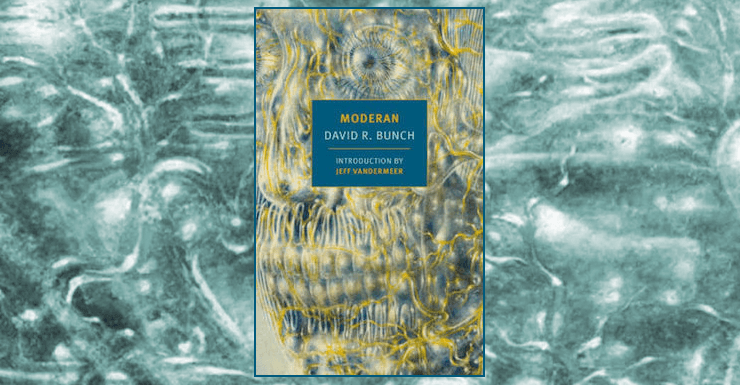For some writers, mechanical or otherwise technological changes to the human body are a way to examine the gulf between self-image and reality, or a means by which the nature of humanity itself can be discussed. The stories that make up David R. Bunch’s Moderan, first published in the 1960s and ’70s, take a somewhat different approach—one that reaches a much more pessimistic conclusion about the future of humanity, while also resonating uncomfortably with our own age of toxic masculinity run rampant. An earlier version of this collection was published in 1971; this new edition adds additional stories (as “Apocrypha From After the End”) and feels all too contemporary—both in its psychology and its vision of a ravaged planet.
Bunch’s book describes, in great detail, life in a future in which mechanical parts (known as “new metal,” which may temporarily confuse any Limp Bizkit superfans reading this) have taken the place of much of the human form. There’s more than a little overlap between Bunch’s “new metal” and the “new flesh” of David Cronenberg’s film Videodrome, from the discomfiting and visceral descriptions of its place in this society to the fanatical way in which its devotees speak about it.
This new world is one of constant war and environmental devastation: the natural landscape has been destroyed in favor of something artificial; significant amounts of oxygen have been removed from the atmosphere and transported off-planet; and a state of ever-present conflict between modified humans is the status quo. In his foreword to this new edition of Moderan, Jeff VanderMeer writes that in this futuristic landscape, “men become fortresses, trapped in remade bodies that personify ritualized aggression.”
All of this makes Moderan an intense read: between the violent alienation of the setting and the hyper-stylized prose on display, it can be a lot to take in in one dose. Narrator Stronghold 10 has a distinct syntax, and Bunch immerses the reader in this new world, and in his narrator’s way of perceiving it. What does Stronghold 10 sound like? To put it in slightly more contemporary terms, imagine a syntax somewhere between the Marvel Comics character X-51 circa Nextwave and the most annoying Twitter feed you can think of. To wit:
“Sentiment was soon quite gone from us, and our souls, if ever we had them, were surely now no more. But fears we retained–they were with us large and small and LARGE. YES! We kept normal fears and abnormal fears and normal desires and abnormal desires. We desired to live; we feared to die. We desired to kill; we feared to die. We defended ourselves. We did live!”
Buy the Book


Moderan
Elsewhere, the narration sounds increasingly unhinged as he describes the aftermath of becoming mostly mechanical, with only a trace amount of organic material (the “flesh-strip”) remaining. It’s here, too, that Bunch’s background in poetry comes to the forefront: even as he describes the most horrific of events, there’s still an undeniable rhythm present, an adept wordplay balancing out the ugliness of the images.
“THEN IT HAPPENED! Like blockbusters. Like retribution. Like, in the Old Days, red-hot knives cutting toes off and fingers off and the ears off and the nose off and the chin off and the testicles off and winches pulling the guts out to grind them while the eyeballs fell back in the blasted and blackened brains and baked there and the blood turned to hot boiling concrete in a pot on a laser beam stove. GOD!”
The first three section of the book are titled, respectively, “Beginnings,” “Everyday Life in Moderan,” and “Intimations of the End.” And through these linked stories, Bunch uses Stronghold 10 as a means to introduce the reader to this futuristic world, and to distill the warlike attitudes of its inhabitants into a single perspective. As suggested by the title of part three (and the allusion to “After the End” in the title of the fourth part), this worldview is not one that can be sustained for very long. Meticulous wargames and technology used only for destruction only have one believable ending; Bunch’s book hauntingly alludes to that even as it surrounds the reader with the triumphalism of its narrator’s complicity in that end.
There are brief moments where Stronghold 10 doubts himself; there are brief suggestions of a better world, of one where conflict does not surround everything. But perhaps the most harrowing aspect of Moderan is its immersiveness: there is no detached observer to state a rational case for de-escalation, and no higher society to calm things down. There are only the basest of desires and the most sophisticated of weapons. Regardless of the era in which we live, that’s a story that’s all too familiar.
Moderan is available from New York Review Classics.
 Tobias Carroll is the managing editor of Vol.1 Brooklyn. He is the author of the short story collection Transitory (Civil Coping Mechanisms) and the novel Reel (Rare Bird Books).
Tobias Carroll is the managing editor of Vol.1 Brooklyn. He is the author of the short story collection Transitory (Civil Coping Mechanisms) and the novel Reel (Rare Bird Books).










